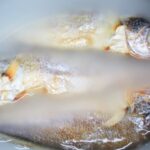
Master the Art of Marinating Fish: Ensure Even Flavor and Eliminate Fishy Odor
Tip for Selecting Delicious Fish
Ideally, opt for live fish. If purchasing dead fish, pay attention to the following details:

Secret Marinade for Fish: Intense Flavor, No Fishy Odor, Tender Meat for Any Dish
– Examine the fish’s appearance. If it’s still slimy, with clear eyes, intact scales, pink gills, and it sinks in water, it’s fresh.
– Conversely, if the fish has mucus, sunken eyes, easily detachable scales, pale color, reduced flesh elasticity, distended belly and anus, and floats in water, it’s spoiled.
– White or yellow fish tend to taste better. Black fish are usually from ditches and don’t taste as good.
– Don’t be squeamish when buying fish. Be thorough; pull back the gills to check—if they’re red, the fish is fresh, but if they’re pale or discolored, it’s spoiled.
Before Marinating, Remember to Clean the Fish:
– For seawater fish, choose fresh ones with clear eyes, red gills, and firm, elastic flesh. Wash the fish with salted water, and remove the gills and any traces of blood before cutting and marinating.
– For river fish, in addition to the fishy odor, there’s also the smell of mud. Wash the fish with salted water or rub it with salt to eliminate the odors during cooking.
– For snakehead fish, remove the skin and scales. Pay attention to the two smelly scales near the head, and remove the smelly thread along the spine.
Note: After cleaning the fish, rinse it with clean water, then wash it with ginger wine, both inside and out. Place the fish in a colander and pour hot water (around 70–80°C) over it to firm up the flesh. Ensure the colander is sparse, so the hot water doesn’t pool and scald the fish. Let the fish drip-dry afterward.
– Depending on the recipe, you can marinate the fish with a few drops of lemon juice to neutralize the fishy odor.
– During cooking, for dishes with sweet and sour sauce or fish sauce, add ginger to eliminate the fishy odor (as in snakehead fish congee, fried mackerel with sweet and sour sauce, or walking catfish served with ginger fish sauce). After preliminary processing, blot the fish dry before cooking to reduce the fishy smell.
– For fried fish dishes, ensure the fish is thoroughly dried, then coat it with a layer of dry coating (tapioca starch, wheat flour, or crispy coating) before frying.
For stewed fish dishes, pay attention to marinating the fish with seasonings and coloring to ensure thorough absorption. When stewing, avoid excessive stirring or mixing, and don’t let the broth boil vigorously, as this can cause the fish to break apart.
– For boiled or steamed fish, serve it immediately while it’s hot. Overcooking can cause the fish to fall apart and the meat to dry out, losing its sweetness.

Note:
When preparing fish, aim to minimize its fishy odor by using specific spices and cooking methods, such as washing the fish with salted water and removing the gills and bloody parts.
For stewed fish, refrain from excessive stirring or mixing, which can cause the fish to break apart and release bitter-tasting bile.
“The Secret Ingredient to Take Your Fish Dish to the Next Level: A Simple Trick to Eliminate Any Fishy Odor”
With just a sprinkle of this magical spice, you can say goodbye to the fishy odor that often lingers during the braising process. This secret ingredient is a game-changer, ensuring your fish dishes are not only delicious but also free from any unwanted smells. A must-have for any seafood enthusiast!





































